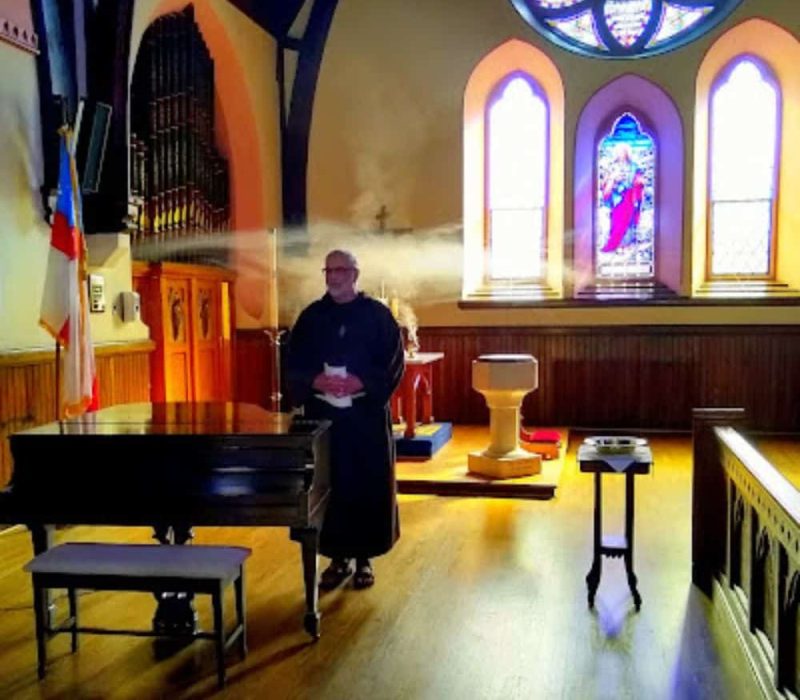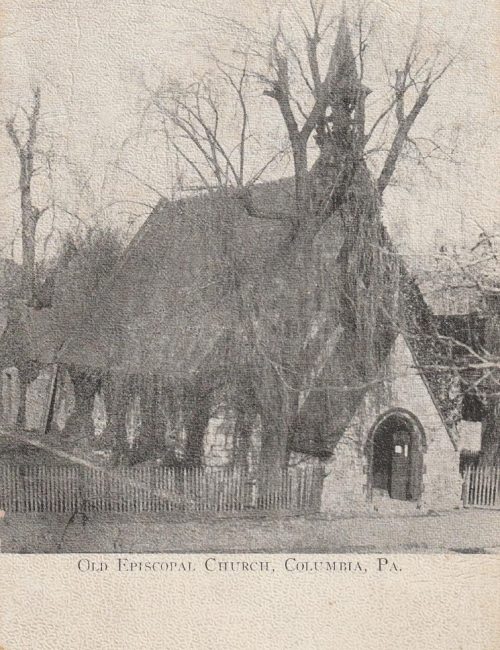Saint Paul Episcopal Church
340 Locust Street Columbia, PA 17512
admin@saintpaulcolumbia.org
717-684-8496
Worship Times:
Saturday – 5pm
Sunday – 9am
Menu
Saint Paul Episcopal Church
340 Locust Street Columbia, PA 17512
admin@saintpaulcolumbia.org
717-684-8496
Worship Times:
Saturday – 5pm
Sunday – 9am
As Episcopalians, we believe that Jesus is the only prefect image of our heavenly father and shows us the nature of God. God is love. Jesus was conceived by the power of the Holy Spirit and became incarnate from the Virgin Mary. The divine Son became human so that in him human beings might be adopted as children of God, and be made heirs of God’s kingdom. Jesus’ resurrection after death on the cross, shows us the way of eternal life.
Saint Paul parish is an active member of the Jesus Movement
“Life is short. We do not have much time to gladden the hearts of those who make the journey with us. So be swift to love, Make haste to be kind…”
-Henri-Frederic Amiel
We are an ongoing community of people who center their lives on Jesus and follow him into a loving, liberating and life-giving relationship with God, each other and creation.
The Jesus Movement – The Episcopal Church
Looking for a personal guide for your spiritual journey?
Check out My Way of Love – The Episcopal Church
For the Episcopal Church, the Jesus Movement calls us to focus on three specific Priorities:
Listen for Jesus’ movement in our lives and in the world. Give thanks. Proclaim and celebrate it! Invite the Spirit to do the rest.
Embody the loving, liberating, life-giving way of Jesus with each other.
Encounter and honor the face of God in creation.
In Jesus, God so loved the whole world. We follow Jesus, so we love the world God loves. Concerned for the global climate emergency, drawing on diverse approaches for our diverse contexts, we commit to form and restore loving, liberating, life-giving relationships with all of creation.
The Episcopal Church’s Covenant for the Care of Creation is a commitment to practice loving formation, liberating advocacy and life-giving conversation as individuals, congregations, ministries and dioceses. Explore the Covenant here and sign up for the newsletter and opportunities to formally adopt the Covenant in your community.

We welcome all who worship Jesus Christ.
The Episcopal Church is a member province of the worldwide Anglican Communion. The mission of the church, as stated in the Book of Common Prayer’s catechism (p. 855), is “to restore all people to unity with God and each other in Christ.”
As part of that mission, we’re following Jesus into loving, liberating and life-giving relationship with God, with each other and with the earth as the Episcopal branch of the Jesus Movement. We seek every day to love God with our whole heart, mind and soul, and to love our neighbors as ourselves (Matthew 22:36-40).

Paul, commonly known as Paul the Apostle or Saint Paul, was a Christian apostle who spread the teachings of Jesus in the first-century world.
Saint Paul is one of the most important and influential of all the saints. Many of his writings are contained in the Canon of the Bible and have influenced the growth and development of the Church since the first century.
St. Paul was originally known as Saul, and he was a Roman citizen and a Pharisee. He even presided over the persecutions of the early Christians and was present at the martyrdom of St. Stephen.
However, Saul experienced a powerful vision that caused him to convert to Christianity while on the road to Damascus. He was duly baptized and took the name Paul.
Paul traveled the world, first to Arabia then back to Damascus. He also visited Jerusalem to see St. Peter, the first pope and pay homage to him. During these travels, he preached ceaselessly, often drawing criticism and ire from those who rebuffed his message. Jews, in particular, hated his preaching as they saw him convert people to Christianity from Judaism.
Eventually, Paul returned to Tarsus, where he was born. He preached there until he was called by Barnabus to come to Antioch. After a year spent in Antioch, a famine occurred in Jerusalem and the pair was dispatched to the city with alms. He accomplished this mission and returned to Antioch.
Paul and Barnabus then went forth on a mission to Cypress and throughout Asia Minor. They established several churches in their travels. After establishing his churches, Paul remained in communication with the faithful, often writing letters to answer questions and resolve disputes.
The letters that have survived have become part of the Bible. It is believed that Paul wrote other letters, which were lost even before the Bible was established by the Church. Paul’s writings are important because they provide good advice for how Christians should live.
Paul traveled throughout much of Europe, particularly in Macedonia, Greece, and Italy. While preparing for a missionary trip to Spain, he was imprisoned in Caesarea by the Jews for two years. He traveled again, was shipwrecked in Malta, and was imprisoned for another two years for preaching in Rome. Despite these imprisonments, Paul continued to preach.
Paul eventually made his way to Spain, then returned to the East, and finally returned to Rome once again. In 67 AD, Paul was arrested in Rome for a second time and this time he was beheaded under the insane Emperor Nero. According to John Chrysostom, Nero knew Paul personally.
Paul is among the most famous, intelligent and influential of the apostles. There are some who argue that he was the leader of the apostles, but this is not supported by evidence. Instead, he likely preached at the request of St. Peter, who was pope.
St. Paul is the patron saint of missionaries, evangelists, writers, journalists, authors, public workers, rope and saddle makers, and tent makers. His feast day is on June 29 when he is honored with Saint Peter, although he is also honored on other days throughout the year: January 25, for his conversion, February 16, for his shipwreck, and Nov. 18 for the dedication of his Basilica.
Beginning in 1837, Episcopal clergy visited Columbia from time to time to celebrate Holy Communion in private homes. There was little parochial activity until Bishop Alonzo Potter of the Diocese of Pennsylvania sent the Reverend Dwight Lyman to establish a permanent parish in Columbia.
The group initially met in a Presbyterian Church. The cornerstone for the first Saint Paul Church was laid on October 6, 1849 at the corner of South Second Street and Avenue I. This church was consecrated on May 28, 1850.
The small congregation, mostly Welsh and English laborers, were in the minority in the community. Pennsylvania Germans worshiping in the Lutheran or Reformed tradition and members of the plain sects heavily dominated the area. Anglicans have traditionally made up a small proportion of churchgoers in this area of Pennsylvania.
During the 1880’s, the Reverend Francis Moran dreamed of great things for Saint Paul Parish and encouraged the building of a new church on Locust Street in the center of Columbia. The new church, built at a cost of $26,000, with a seating capacity of 300, was consecrated on January 25, 1888. A stone parish house was built at the rear of the church in 1891.

O Lord, open my lips, and my mouth will declare your praise. -Psalm 51
Music is an essential part of our worship experience. Through music and song we praise God and offer thanksgivings for His work in our lives.
Saint Paul has received a grant to support collaboration with neighboring parishes on ways to enhance our musical offerings.

Sunday School : children ages 5-12
Our teachers are a committed, caring group of adults who engage their students. They each offer their unique gifts for encouraging and uplifting children in their belief in God and membership in the church.
The children will learn from the same scriptures as our readings and Gospel for each particular Sunday. This helps families take the message home and talk about what their whole family is learning each week
Convocation-wide Youth Events

Bible study offered beginning in Eastertide 2023